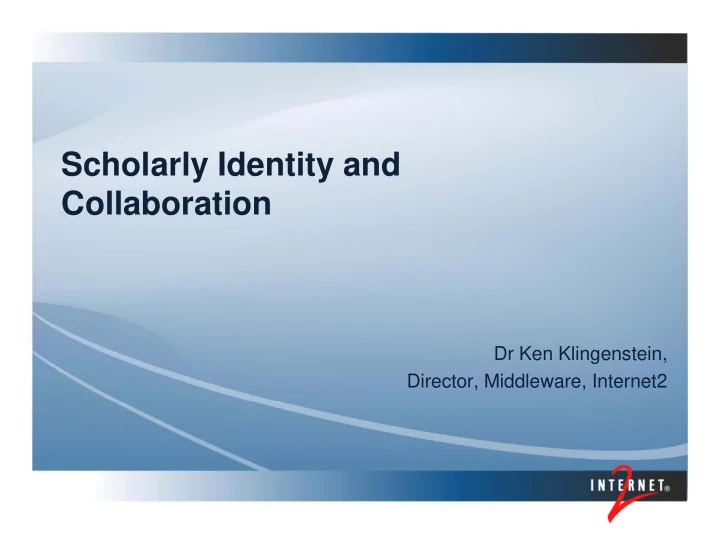

Scholarly Identity and Collaboration Dr Ken Klingenstein, Director, Middleware, Internet2
User Contexts • Individuals do trusted Internet transactions in a variety of contexts • The enterprise/federated use of identity well- established; may be enhanced with roles • Consumer • Citizen • Geo-temporal • Personal “wallet” – preferred language, accessability, etc • Same identity; different roles; different policies and governance on privacy, etc kjk@internet2.edu
Privacy management • Small spanning set of attributes • Extensible but end-user manageable • Use of bundles to minimize complexity • Rich metadata for trusted dialogue • Defaults, learning to minimize dialogues • Putting the informed into informed consent • End user privacy manager with quality UI, some out of band consent, context-sensitive, getting the defaults right kjk@internet2.edu
Elements of Scholarly Identity • Attribute management for collaboration • The R&S bundle • Eduperson and the ORCID identifier • Cyberinfrastructure identity • CIlogon - www.cilogon.org - bridging federated logon with national computational resources • IGTF type certificates • Social to SAML gateways • Science Agency data set access controls • Collaboration platforms • VO IdM + “domesticated applications” • CoCoA • Opportunities for leverage and integration kjk@internet2.edu
Attribute management • The R&S bundle is intended precisely for collaboration and scholarship • Hugely eases the boarding process for new apps by giving IdP’s defaults for necessary attribute release • Qualified apps include most R&S services • Eduperson normative university schema • Should it include the ORCID identifier? • If so, how would it be populated? • If so, how can it be leveraged? • Others? kjk@internet2.edu
Data lifecycle access management • Agencies call for research data management plans but neglect long-term access control issues • Not all data is public – sensitive, PHI, international or private, etc. • Access controls may change over time, by policy or sale or types of devices or … • Access controls are needed • Scalable • Linkable identities kjk@internet2.edu
Collaboration platforms • Drive identity and access control for both general collaboration and domain-specific apps • Leverage existing IdM technologies • Leverage existing IdM deployed infrastructure • Connect to the scholarly record • Offer a variety of implementation and deployment options • https://spaces.internet2.edu/display/COmanage/Vide o kjk@internet2.edu
ABC: A Typical Use Case of VO IdM • Has 50 researchers who can schedule ABC instruments, run compute jobs on the TG with ABC allotments, etc • Has 500 academics who need access controlled wikis, ad hoc calendaring (ala Doodle), lists, VO event calendaring, file sharing, chat rooms, videoconferencing, etc. • Has administrators at fifteen universities who can access rosters, change roles, etc. • Has partner VO’s in other countries, with varying privileges on what they can see and use on ABC resources • Has outreach coordinators at 50 school districts who can post/read to certain wiki sections • Works closely with publishers, funding agencies, etc. kjk@internet2.edu
kjk@internet2.edu
The LIGO List for domestication • wiki/web (read, read-write, admin) • polling • mailing list (subscribe, moderate, • dcc- document control center post-only, view-archive, admin) • command line tools • repository (read, read-write, • grid space admin) • guests • ticketing system (post, view, • google apps modify, manage) • conferencing • voting system (create, vote, view) • activity streams • calendaring • roster kjk@internet2.edu
Integration around the scholarly record • Campus scholarly systems, whether home-brew, emerging open-source or commercial product, need enterprise authentication and basic access controls, e.g. groups and roles • Trusted citations • Integration of scholarly API’s (e.g. LTI) with federated richness • ScienCV kjk@internet2.edu
Opportunities • For leverage • The value of a unique disambiguated identifier • Federation entity metadata • For aligned business processes • Membership, subscription, delegation, etc • Contracts, liability and indemnification • For sustainability • Scholarly Identity as a Net+ service • What to include? • Expansive in vision but select in choices kjk@internet2.edu
Some thoughts • Can all the varieties of metadata sharing use some common tools • Register, publish, aggregate, manage and control • PEER, aggregators, etc. • InCommon/I2 interest is not discovery of data, not content or taxonomies but access to content • Future – rich metadata for discovery, ontology tools and mapping but not complex access controls on the data • Conservation of policies • Reputation systems, experts, the grinding part of research kjk@internet2.edu
Recommend
More recommend